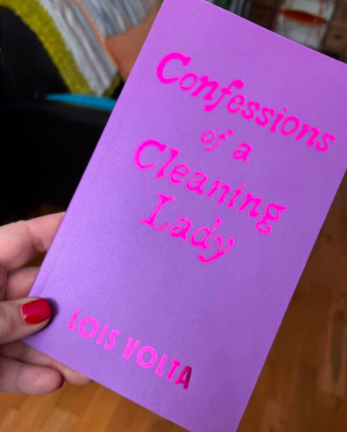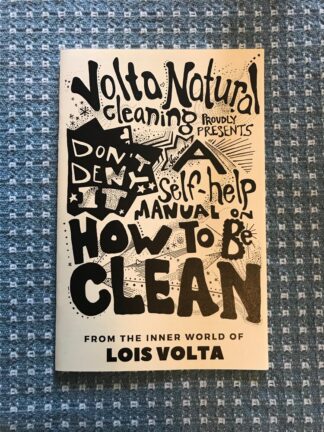
Lois Volta, Germantown Meeting, wants you to clean your house. Not just for the aesthetic reasons, but for the spiritual and feminist reasons. As she writes, “There will always be something waiting for you to clean up. It’s better to make peace with this concept than to fight it. Let contentment and peace be just as never-ending as the laundry.”

Her book, Confessions of a Cleaning Lady, is equal parts self-help guide, feminist manifesto, and handbook for creating cleaner domestic spaces. She owns a household domestics company that addresses domestic strategy, clutter due to late-stage capitalism, gender, and family dynamics within the home. She also has a staff of deep-cleaning professionals. Volta can also be found on G-town Radio, as co-host of the podcast The Everyday Feminist, alongside Stephanie Heck.
We asked Lois to break down the principles of her method — her approach to domestic care that expands beyond just tidying up and goes well into dismantling consumerism and gender norms.
How do you find that gender equity plays out in how chores are distributed amongst a household?
I have found that even some of the most progressive couples who actively promote equality for women do not exercise gender equality in their homes. I believe this is due, at least in part, to generational issues (ie;how and when we were raised), our cultural background, and our relationship to household work. In order for chores to be distributed more equally, each person needs to take stock of the amount of personal responsibility they are exercising in the home. In most cases, there is a wide gender gap between individual and communal responsibility in labor, thought, and emotion when it comes to the domestic load.
Many households try to strike a balance, but unfortunately, most of us feel as though we have a long way to go. Actively questioning domestic balance in a household is a big part of cultivating harmonious, loving, and equitable homes.
What type of bold conversations are necessary to bring this into better balance?
It is troublesome that so many people tip-toe around talking about the gender and domestic imbalances within their households. Asking questions like these can help start critically important conversations: How can we foster a respectful environment so that we all feel safe talking about the division of labor? How can I be a better listener and hold concerns without defensiveness or judgment? How do we envision a thoughtful solution?
These types of queries are a healthy starting point for open conversations around achieving balance. Furthermore, respecting each other in the home is paramount for any type of societal reflection and role-modeling that children need to see.
What advice would you give to families with children to raise them with both good cleanliness habits and an awareness of how to break down gender-normative roles?
Teach children personal responsibility while living day to day.
A great place to learn this is in front of the bathroom mirror. When we brush our teeth, do we splatter the mirror with spittle? If we do, do we clean it up, or does someone else magically make it disappear?
When we find out how we participate in the mess, we have the choice of how we respond in action. We can either own the truth that we made the mess and clean it up, or just take a step or two back from the mirror so we don’t splatter dirt in the first place.
Teaching children this type of awareness gives them practice taking responsibility for their personal and physical actions. Teaching children the cause and effect of everyday acts helps them understand why we should live thoughtfully. It’s easier to show them how to clean when they understand how the dirt got there in the first place. From there, parents can model good habits.
It’s a communal act to be a family- showing respect for each other by cleaning up after ourselves gives us a beautiful opportunity to teach children about how to be good stewards of our homes and communities. Cleaning up after ourselves is meaningful, especially if the weight of the domestic load has disproportionately fallen on one person.
Showing our children that it’s essential to see how much of a mess we all create has the added benefit of making them better suited to address more significant issues like climate change. Humans are messy and there is a lot to clean up- best to start right where we lay our heads and hang our coats. We can look out of our windows and feel a sense of agency and hope when we have a rooted understanding of personal responsibility. And then we can act accordingly.
None of this is gendered! However, it requires parental role-modeling to be effective. Families can practice stewardship, integrity, community, equality, and simplicity by working together to clean up the house. The joy is that these actions cultivate peace that can be felt and experienced at home and in real-time.
What is the connection between cleanliness, spirituality and gratitude?
When I’m folding my laundry or cleaning up after dinner, I find it important to view the task as an extension of my spirit. Is my heart frustrated or resentful for having to care for myself and those around me? Or, is my present self actively caring for my future self? When I think about how my future self will thank my past self, it gives me the pride of living in the moment and a heart full of gratitude. It’s a way of being in relationship with the art of living that happens through the healing and monotonous acts of tending to life.

Dive deeper into Lois’s work
Find out how you can buy Lois’ book, hire Lois to help with your home and listen to her show on her website loisvolta.com.
This is the first in an occasional series highlighting some of the unique gifts and offerings of members of the PYM community. Know a Quaker maker, artist or entrepreneur we should profile? Please send suggestions to communications@pym.org.